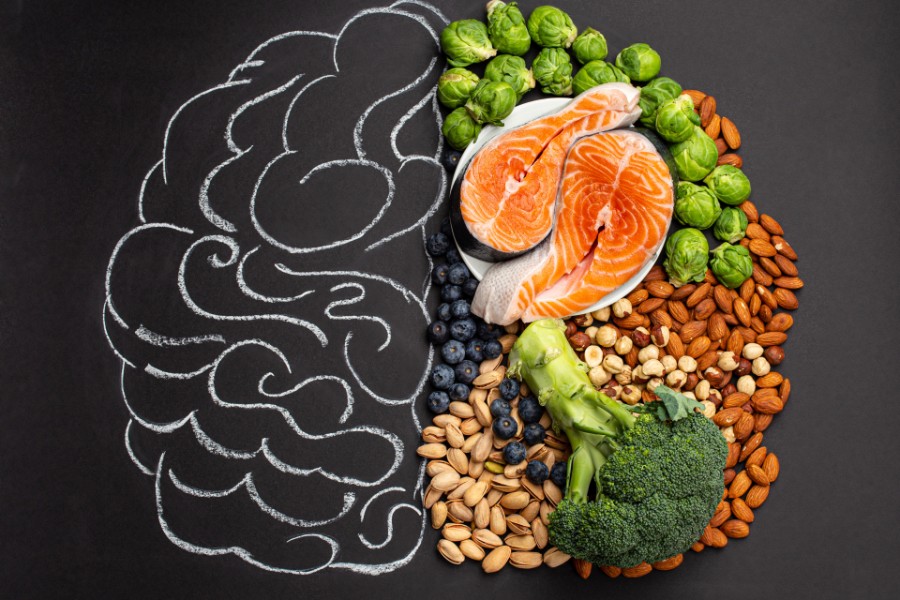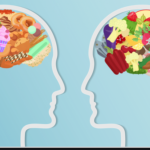Role of Nutrition for Dementia and Alzheimer
In this Article on Nutrition for Dementia, understand that nutrition plays a crucial role in maintaining overall health and well-being, and it becomes even more vital when addressing conditions like dementia and Alzheimer’s disease.
Proper nutrition can help manage symptoms, slow disease progression, and improve the quality of life for individuals living with these conditions.
Alzheimer’s disease and dementia are brain disorders that get worse over time and take away a person’s ability to think and be independent. Although there is no cure yet, studies show that the food we eat can have a big effect on how these diseases develop.
This idea that what we eat can affect Alzheimer’s and dementia care could greatly help improve the lives of patients and their caregivers.

The Gut-Brain Connection and the Impact of Diet
The human body is like a complicated system, and the gut is very important for keeping the body healthy, including the brain. The gut has trillions of tiny organisms that talk to the brain through a complex network of signals.
Research shows that problems in the bacteria in the gut may lead to inflammation in the brain, which is important in causing Alzheimer’s and dementia. What you eat affects the kinds of bacteria in your stomach.
The Role of Nutrition in Alzheimer’s and Dementia Care
In nutrition for dementia, eating lots of fruits, vegetables, whole grains, and legumes helps good bacteria grow, and they make things that reduce inflammation. On the other hand, eating a lot of processed foods, saturated fats, and added sugars can harm the gut bacteria and make inflammation worse.
Specific Dietary Approaches for Alzheimer’s and Dementia Care
Some ways of eating may help prevent and control Alzheimer’s and dementia. Let’s take a closer look at some of the best ways to do something:
- Mediterranean Diet: This healthy diet focuses on eating lots of fruits, vegetables, whole grains, fish, olive oil, and legumes. You can also have some chicken, dairy, and red wine in moderate amounts. It’s good for your heart. Studies show that eating a Mediterranean diet could help keep the brain healthy and lower the risk of Alzheimer’s disease by reducing inflammation and oxidative stress.
- MIND Diet (Mediterranean-DASH Intervention for Neurodegenerative Delay): The MIND Diet is a mix of the Mediterranean and DASH diets, designed to help delay neurodegenerative diseases. It suggests eating a lot of healthy foods like vegetables, fruits, nuts, and whole grains, as well as poultry and fish. It also suggests not eating a lot of red meat, fried foods, or pastries. Research shows that the MIND diet can help to slow down the decline in thinking and memory.
- DASH Diet: The DASH diet was made to help lower blood pressure. It focuses on eating lots of fruits, vegetables, whole grains, and low-fat dairy. It also suggests limiting red meat, fats, and salt. While the DASH diet is not meant for Alzheimer’s, it can still help the brain because it focuses on keeping the heart healthy.
Essential Nutrients for Brain Health
Aside from certain diets, some specific nutrients have been connected to helping the brain stay healthy and possibly lowering the chance of getting Alzheimer’s and dementia. These things are:
Omega-3 Polyunsaturated Fatty Acids: Omega-3 fatty acids are important for our brains. We can find them in fatty fish, flaxseeds, and walnuts. They help our brain cells work well and communicate with each other.
B Vitamins (B6, B12, and Folic Acid): B Vitamins (B6, B12, and Folic Acid) are important for keeping nerve cells healthy and may help lower levels of homocysteine, an amino acid linked to a higher risk of Alzheimer’s.
Vitamin E: This antioxidant might help keep brain cells safe from harm caused by free radicals.
Vitamin D: New research shows that not having enough vitamin D may raise the chances of getting Alzheimer’s disease.
Importance of Nutrition
Let’s delve deeper into each aspect of nutrition for dementia and Alzheimer’s disease to provide a more comprehensive understanding.
Brain Health:
Nutrients for Cognitive Function: Certain nutrients like vitamins B12, folate, and vitamin E play crucial roles in maintaining cognitive function and protecting brain cells. Deficiencies in these nutrients can accelerate cognitive decline.
Gut-Brain Connection: Emerging research suggests that gut health may influence brain health. Probiotics and a fiber-rich diet can support a healthy gut microbiome, potentially benefiting brain function.
Energy Levels:
Balanced Macronutrients: A balanced intake of carbohydrates, proteins, and fats ensures sustained energy levels throughout the day. Carbohydrates provide immediate energy, while proteins and fats offer longer-lasting energy and satiety.
Meal Timing: Eating regular meals and snacks spaced evenly throughout the day can help stabilize blood sugar levels, preventing energy dips and fatigue.
Overall Health:
Chronic Conditions Management: Many individuals with dementia or Alzheimer’s disease have other health conditions like diabetes, hypertension, or cardiovascular disease. A nutritious diet can help manage these conditions, reducing complications and improving overall health.
Medication Interactions: Some medications prescribed for dementia or Alzheimer’s may interact with certain nutrients or foods. It’s essential to be aware of potential interactions and adjust the diet accordingly.
Dietary Considerations
Antioxidant-Rich Foods
Types of Antioxidants: Apart from vitamins C and E, other antioxidants like flavonoids and polyphenols found in fruits, vegetables, and teas have neuroprotective effects.
Food Sources: Incorporate a variety of colorful fruits and vegetables, especially berries, cherries, spinach, kale, and broccoli, to maximize antioxidant intake.
Omega-3 Fatty Acids:
Types of Omega-3s: The primary omega-3 fatty acids beneficial for brain health are EPA (eicosapentaenoic acid) and DHA (docosahexaenoic acid).
Food Sources: Include fatty fish like salmon, mackerel, and sardines, as well as plant-based sources like walnuts, flaxseeds, and chia seeds in the diet.
Whole Grains:
Nutritional Benefits: Whole grains are rich in fiber, vitamins, minerals, and phytonutrients beneficial for brain and overall health.
Variety: Experiment with different whole grains like quinoa, barley, bulgur, and whole wheat to diversify nutrient intake and add variety to meals.
Healthy Fats:
Types of Healthy Fats: Monounsaturated fats (e.g., olive oil, avocados, nuts) and polyunsaturated fats (e.g., sunflower oil, fatty fish) are beneficial for heart and brain health.
Portion Control: While healthy fats offer numerous benefits, it’s essential to consume them in moderation due to their high calorie content.

Limit Sugar and Processed Foods
Impact on Cognitive Health: High intake of sugar and processed foods can lead to insulin resistance, inflammation, and oxidative stress, negatively impacting cognitive function.
Healthy Alternatives: Opt for natural sweeteners like honey or maple syrup, and choose whole foods over processed snacks and meals.
Hydration:
Significance of Hydration: Proper hydration supports cognitive function, mood regulation, and overall physiological processes.
Water Intake: Aim for at least 8-10 cups of water daily, adjusting for individual needs based on age, activity level, and climate.
Vitamin D:
Role in Brain Health: Vitamin D receptors are present in the brain, and adequate levels are associated with better cognitive function and mood regulation.
Sun Exposure and Supplementation: Balance sun exposure to maintain vitamin D levels within the optimal range and consider supplementation if deficiency is detected.
Practical Tips
Meal Planning:
Batch Cooking: Prepare meals in batches and freeze individual portions for convenience and consistency.
Nutrient-Dense Snacks: Keep nutrient-dense snacks like mixed nuts, yogurt, or fruit readily available for quick and healthy options.
Regular Meals:
Importance of Consistency: Regular meal times help maintain circadian rhythms, improve digestion, and stabilize blood sugar levels.
Family and Social Meals: Engaging in family and social meals can enhance the dining experience, stimulate appetite, and promote overall well-being.
Supplementation:
Individualized Approach: Consult with a healthcare professional to assess nutritional status and determine if supplementation is necessary.
Quality and Safety: Choose supplements from reputable brands that undergo third-party testing to ensure quality, purity, and safety.
Adapt to Preferences and Needs:
Cultural Sensitivity: Respect cultural dietary preferences and traditions when planning meals to ensure acceptance and enjoyment.
Texture and Presentation: Consider individual preferences regarding food texture, temperature, and presentation to make mealtime more enjoyable and stimulating.
Seek Professional Guidance:
Collaborative Care: Work collaboratively with a multidisciplinary team, including dietitians, physicians, and caregivers, to develop and implement a comprehensive nutrition care plan.
Ongoing Monitoring: Regularly review and adjust the nutrition plan based on individual needs, preferences, and health status to optimize outcomes and promote well-being.
By understanding and implementing these comprehensive nutrition guidelines and practical tips, caregivers and loved ones can play a vital role in supporting brain health, managing symptoms, and enhancing the quality of life for individuals living with dementia and Alzheimer’s disease.
SEE ALSO: Papaya Leaves Benefits
Nutritional Challenges in Alzheimer’s and Dementia Care
Regarding nutrition for dementia, there are a few Nutritional Challenges in Alzheimer’s and Dementia Care.
People with Alzheimer’s and dementia often have a hard time staying healthy because of the challenges they face. These can include:
Loss of appetite: Having trouble with remembering to eat or not feeling hungry can cause a lack of proper nutrition.
Chewing and Swallowing Difficulties: As the disease gets worse, it can become hard to chew and swallow food. This can make it difficult to eat certain foods.
Cognitive Decline: Forgetting things and feeling confused can make it hard for people to make meals or eat at the right times.
Strategies for Overcoming Nutritional Challenges
Regarding nutrition for dementia and Alzheimer, caregivers are very important in making sure people with Alzheimer’s and dementia eat well.
Here are some ways that can help:
Offer a Variety of Nutrient-Rich Foods: Provide a variety of healthy foods that are easy to eat, like cut-up fruits and veggies, soft fish, and mashed potatoes.
Create a Pleasant Dining Environment: Make a nice place to eat: Having a peaceful and comfortable setting can make mealtime more enjoyable.
Set Consistent Meal Schedules: Eat meals at the same time every day. This can help you feel normal and hungry.
Involve the Individual in Meal Selection and Preparation: Include the person with dementia in choosing and making meals as best you can. This can help them feel more in control and respected.
Get help from a professional: Talk to a dietitian for custom meal plans and ways to deal with specific problems.
Conclusion
In summary, what you eat is important for caring for people with Alzheimer’s and dementia. Eating the right foods can help slow down these conditions and make life better.
By focusing on healthy foods and using dietary plans that help the brain, people who take care of those with Alzheimer’s and Dementia can help them feel better and manage their condition.
Additionally, continued study and learning in this area are important to better understand how nutrition affects Alzheimer’s and Dementia Care. This will help develop specific treatments and make improvements in the future.

A graduate of Computer Science and Information Management Technology. Diploma – Caregiving, Certificates – Dementia and Diabetes Awareness and Management. A researcher, blogger, songwriter, singer and acoustic guitarist. Born in an environment where natural talents such as healing are imparted at our natural birth. This natural talents of healing is the result of our genetic inheritance and the training from family environment.


















